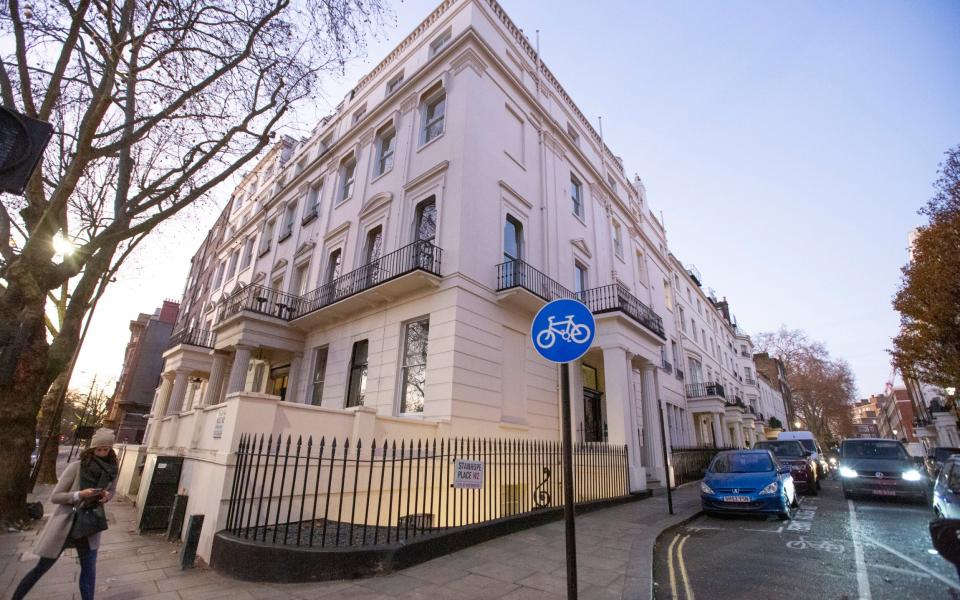Violence shatters Pakistani elite as thousands protest 'illegal' land grab

- Oops!Something went wrong.Please try again later.
For those fortunate enough to own a home in a Bahria Town development, the elite suburb promises to offer a respite from the clamour of life in much of Pakistan.
Prospective residents from Karachi are lured with assurances that they can swap the blackouts, floods and rubbish heaps of the port metropolis for a luxury lifestyle in a manicured architectural fantasia.
Brochures offer world class amenities, a floodlit golf course and even a replica Parthenon.
Yet two weeks ago the haven of Bahria Town appeared more of a war zone than a haven of peace and serenity. The imposing front gate, which has been likened to a spaceship, was ablaze, while shops and offices in the development were being smashed up and vandalised by rioters.
Terrified residents were left to take refuge in their homes and complain about the lack of police.
While Pakistan is often gripped by political and religious protests, the rich are rarely targeted - and the violent intrusion in Bahria Town has shaken elite Pakistani society beyond its gates.
The riot on June 6 followed a protest by as many as 10,000 people against a project which has been mired in controversy since it began.
The Bahria Town development on the eastern outskirts of Karachi in Sindh province calls itself Asia’s largest private property developer, but has been accused of illegally grabbing land, forced evictions and the bulldozing of villages.
'We do not accept the existence of Bahria Town'
The project has been the subject of protests by groups representing local Sindhi's for years, but the June 6 protest was by far the biggest held against the development.
“First the bulldozer is driven and then the land owner is threatened by the police and the land deeds are taken away,” said Qadir Magsi, head of one of the Sindhi nationalist parties that held the protest. The development was clearing old graves and ancient villages, he said.
“We do not accept the existence of Bahria Town in our land. The poor people of Sindh cannot afford such expensive plots and houses,” he told the Telegraph.
In May protestors opposing the clearing of villages to expand the development said they had been fired on by security guards.
Police have cracked down hard after the unrest, with at least 162 arrests on arson and rioting charges.
Sindh's chief minister, Syed Murad Ali Shah, said: “Everyone has the right to protest, but violence will not be tolerated. If anyone does so, action will be taken.”

The man behind the Bahria Town development is Malik Riaz Hussain, one of the country's richest men and its most successful property tycoon. As well as the Karachi development, his company has similar ventures in other major cities across the country.
His wealth is such that he is accused of being able to buy whatever local politicians he needs and allegedly paying off journalists for favourable coverage of his empire, which he denies. He says Bahria Town has not undertaken illegal activities.
In 2019, Pakistan's supreme court accepted an offer from him to pay 460bn rupees (£2.1bn) for nearly 17,000 acres of land outside Karachi which had been illegally granted to him by local authorities, according to a court ruling.
The same year his family agreed to hand over £190m to UK investigators in the largest asset recovery ever recorded by the National Crime Agency.
The out-of-court settlement included a £50m house overlooking Hyde Park, as well as £140m in frozen accounts. There was no admission of wrongdoing.
The deal did not find any guilt and said the money would be “returned to the State of Pakistan,” a statement said.

Bahria Town's residents' and businessmen have demanded tough action against the rioters. The culprits “should be severely punished so that the confidence of the business community is restored, and the federal and provincial governments can repair all the damage," said one.
But the parties behind the protest have vowed to continue their campaign, and claimed they had no role in the riots and suggested the violence had been orchestrated to discredit them.
Syed Jalal Mehmood Shah, convener of the Sindh Action Committee said: “Miscreants were allowed to set ablaze property despite the presence of thousands of police. They had no relation with us. So, we ask why did police and security allow them to set fire to cars and shops. If someone would grab the land of Sindh, we will stop them.”

